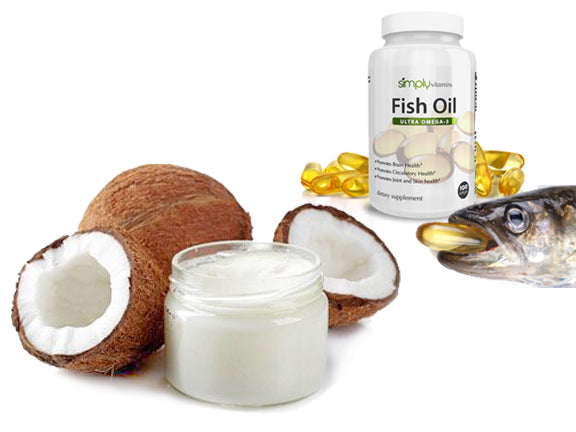Coconut oil and fish oil are healthy sources of dietary fat, but each have a unique structure and are metabolized and used by the body in different ways.
So, what are the functions of coconut oil and fish oil in the body? How can they benefit your pet's health? And should you supplement their diet with one – or both – of these oils?
To answer these questions, let's start by taking a look at the different structures of coconut oil and fish oil.
Coconut Oil
Coconut oil is a medium-chain fatty acid, comprised of a chain of 12 carbon atoms. It is a saturated fat, but unlike the saturated fats in animal fats, which are long-chain fatty acids (LCFAs), coconut oil contains medium-chain fatty acids (MCFAs). The MCFAs in coconut oil are mainly lauric acid, caprylic acid, and capric acid.
Saturated fats are made of single carbon bonds, which mean that the oil is stable and not prone to oxidation or free-radical formation. Coconut oil does not need to be refrigerated and has shown no signs of rancidity, even after three years of storage.

Fish Oil
Fish oil is a long-chain fatty acid, comprised of a chain of 18 carbon atoms. It is an Omega-3 polyunsaturated fat comprised of essential fatty acids, eicosapentaenoic acid (EPA) and docosahexaenoic acid (DHA). These essential fatty acids are found in cold water fish such as mackerel, salmon, and tuna.
EPA and DHA are highly unsaturated fats because they contain 6 and 5 double carbon bonds on their long structured chain. Because of the double carbon bonds, fish oil is more unstable and prone to oxidation when subjected to light or high heat during storage.
So, now you know a little about the science behind the structure of each oil. Just remember that coconut oil and fish oil are very different kinds of fats. This means that they have different functions in the body, and provide their own unique health benefits.
In the next section of the post we'll look at some of the primary health benefits of each oil.
Health Benefits of Coconut Oil
The medium-chain fatty acids in coconut oil are responsible for its unique and remarkable nutritional profile. These MCFAs have potent antimicrobial properties that help your pet fight infection and disease caused by bacteria, viruses, yeast, fungi, and parasites.
Coconut oil boosts metabolism, providing increased energy and helping your pet maintain a healthy weight. It also acts as an anti-inflammatory and antioxidant, and helps support the brain and nervous system, digestive tract, immune system, and cellular function. It's even thought to have anti-cancer properties and improve heart health.
Outside the body, coconut oil can help keep your pet's skin and coat healthy, protect against external parasites such as fleas and ticks, and speed up the healing process of injuries like cuts, wounds, insect bites and burns. No wonder coconut oil is considered one of the healthiest foods found in nature!
Health Benefits of Fish Oil
The Omega-3 fatty acids in fish oil have anti-inflammatory properties, and may help protect against heart disease and cancer. The EPA and DHA essential fatty acids in the oil are converted into hormone-like substances called prostaglandins, which regulate cell activity and healthy cardiovascular function.
The EPA and DHA in fish oil primarily improve brain function and normal eye health. DHA is a building block of tissue in the brain and the retina of the eye. It helps with forming neural transmitters, such as phosphatidylserine, which is important for brain function.
Other benefits of fish oil's anti-inflammatory properties include a reduction in most types of allergies and prevention of skin disorders. The anti-inflammatory properties of fish oil can also help protect against conditions such as osteoarthritis which typically affect senior pets.
Supplementing Your Pet's Diet with Healthy Oils
At the start of this post, we outlined the differences in structure between coconut oil and fish oil. We then explored some of their primary health benefits. Now, let's take a look at how to supplement your pet's diet with these healthy oils.
But first, you may be wondering if you should supplement your pet's diet with both fish oil and coconut oil. The short answer to this is yes, but it's a good idea to rotate coconut oil and fish oil on alternate days so that your pet gets the benefits of both types of oils.
Some pets may develop sensitivities and allergies to fish oils, especially if given daily over long periods of time. It's always best to provide as much variety as possible when supplementing your pet's diet. This will ensure they receive as much nutritional support as possible.
A daily dose of fish oil between 20-55mg combined EPA and DHA per pound of body weight is generally considered safe for dogs and cats. Please refer to our post, How to Use Coconut Oil With Your Pets for recommended daily doses of coconut oil.
Choosing a High-Quality Oil
Before introducing coconut oil or fish oil to your pet's diet, make sure that the oils you purchase are of a high quality. CocoTherapy therapeutic-grade virgin coconut oil is safe, unrefined, and packed full of the wonderful health benefits that make it a true "superfood."
All our coconuts are sourced from our family-owned, USDA-inspected coconut plantation in the Philippines, and each batch of oil is carefully produced in our family-owned facility.
When you choose CocoTherapy coconut oil, you're guaranteed a safe, organic and therapeutic-grade oil packed full of the natural ingredients that will support your pet's health for years to come. Click here to find out more about the CocoTherapy Difference.
There are lots of great brands of fish oil on the market too, just be sure to read reviews online and expect to pay a little more for a quality product. Our previous post, Fake Oils: Virgin Olive Oils Can Fake It, and So Can Virgin Coconut Oils, contains some useful information on the topic of choosing high-quality oils.

That's it for today. We hope you enjoyed the post and learned a thing or two about the benefits of coconut oil and fish oil. Do you supplement your pet's diet with healthy oils? Let us know in the comments!


